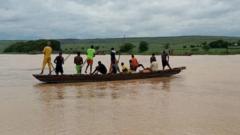How Are Rescuers in Nigeria Searching for Dozens Missing After a Boat Capsize?

Boat Accidents in Nigeria: A Growing Concern
In recent years, boat accidents have emerged as a critical public safety issue in Nigeria, with numerous incidents resulting in tragic loss of life. The country’s waterways, while vital for transportation and commerce, often become scenes of disaster due to a combination of overcrowding, inadequate safety measures, and poor vessel maintenance. This article explores the alarming frequency of boat accidents in Nigeria, the factors contributing to these incidents, and potential solutions to enhance safety on the waters.
The Recent Boat Accident in Sokoto State
The recent incident in Sokoto state has raised significant concerns about maritime safety in Nigeria. Reports indicate that a boat, which was carrying over 50 passengers to a local market, capsized in the River Goronyo. Rescuers are currently searching for more than 40 missing individuals, with only four confirmed survivors so far. The National Emergency Management Agency (NEMA) has pledged to intensify search efforts in collaboration with local authorities to locate those still missing. This tragedy underscores the urgent need for improved safety regulations and enforcement in the region.
Understanding the Causes of Boat Accidents
Boat accidents in Nigeria are often attributed to several interrelated factors, including:
- Overcrowding: Many vessels operate beyond their capacity, which significantly increases the risk of capsizing.
- Poor Maintenance: Many boats are inadequately maintained, leading to mechanical failures that can cause accidents.
- Lack of Safety Regulations: Although regulations exist requiring life jackets for all passengers, enforcement is often lacking, particularly in rural areas.
- Environmental Factors: Navigating through challenging weather conditions and rough waters can exacerbate the risk of accidents.
Historical Context of Boat Accidents in Nigeria
Boat accidents are not new to Nigeria. In December 2024, the country witnessed a devastating incident where 54 bodies were recovered from the River Niger after a boat carrying more than 200 passengers capsized. This was particularly alarming as it was the third such incident within a 60-day period. Just a month earlier, a wooden dugout canoe, overloaded with nearly 300 passengers, sank in the middle of the Niger, resulting in nearly 200 fatalities.
These incidents highlight a troubling trend in Nigeria's maritime safety record. In another tragic event two years prior, more than 100 individuals drowned when a vessel carrying around 300 passengers capsized while traveling from Kwara state to Niger state after a wedding celebration. Such occurrences raise serious questions about the effectiveness of safety protocols and the regulatory framework governing water transport.
The Role of Government and Local Authorities
The Nigerian government, alongside local authorities, has a critical role to play in addressing the issue of boat safety. Effective measures could include:
- Strict Enforcement of Safety Regulations: Increasing the frequency of inspections to ensure vessels comply with safety standards could help reduce accidents.
- Public Awareness Campaigns: Educating communities about the importance of safety measures, such as wearing life jackets, can encourage safer practices among passengers and operators.
- Investment in Infrastructure: Improving landing sites and waterways can enhance safety and accessibility for local communities.
- Training for Operators: Providing training for boat operators on safety protocols and emergency response can prepare them for potential crises.
Community Involvement in Safety Initiatives
Community involvement is crucial in promoting boat safety. Local leaders and organizations can collaborate with government agencies to implement safety initiatives. Some potential community-based strategies include:
- Establishing Local Safety Committees: These committees can monitor boat operations and ensure compliance with safety regulations.
- Organizing Safety Drills: Regular drills can prepare both operators and passengers for emergency situations, improving overall readiness.
- Encouraging Reporting of Unsafe Practices: Creating a culture where unsafe practices can be reported without fear of retribution can lead to improved safety measures.
Looking Ahead: The Future of Maritime Safety in Nigeria
The tragic incidents of boat capsizing in Nigeria are a wake-up call for the nation. While the government and local authorities are beginning to recognize the urgency of the situation, much more needs to be done. Comprehensive reforms in the maritime sector are essential to prevent future accidents and protect lives. These reforms should focus on:
- Investing in Safer Vessels: Encouraging the use of modern boats equipped with safety features can reduce the likelihood of accidents.
- Implementing Technology: Utilizing technology for monitoring vessel conditions and passenger numbers can help ensure compliance with safety regulations.
- Engaging International Partners: Collaborating with international maritime organizations can provide valuable insights and resources for enhancing safety standards.
Conclusion
The frequency of boat accidents in Nigeria demands urgent action from both the government and local communities. By prioritizing safety measures, enforcing regulations, and investing in infrastructure, it is possible to significantly reduce the risk of future tragedies. The recent incident in Sokoto is a stark reminder of the lives at stake and the importance of a proactive approach to maritime safety. As Nigeria navigates these challenges, the collective effort of all stakeholders will be crucial in fostering safer waterways for everyone.
FAQs
What are the main causes of boat accidents in Nigeria?
The main causes of boat accidents in Nigeria include overcrowding, poor maintenance of vessels, lack of enforcement of safety regulations, and challenging environmental conditions.
How can boat safety be improved in Nigeria?
Improving boat safety in Nigeria can involve stricter enforcement of safety regulations, public awareness campaigns, investment in infrastructure, and training for boat operators.
What role do local communities play in enhancing maritime safety?
Local communities can enhance maritime safety by establishing safety committees, organizing drills, and encouraging the reporting of unsafe practices.
What are some recent boat accidents in Nigeria?
Recent boat accidents in Nigeria include a capsizing in Sokoto state where over 40 passengers are missing, as well as several incidents in 2024 where hundreds of passengers were involved in tragic accidents on the River Niger.
As we reflect on the challenges facing Nigeria’s maritime safety, what steps do you believe should be prioritized to prevent further tragedies? #MaritimeSafety #Nigeria #BoatAccidents
```Published: 2025-08-18 09:54:20 | Category: world



